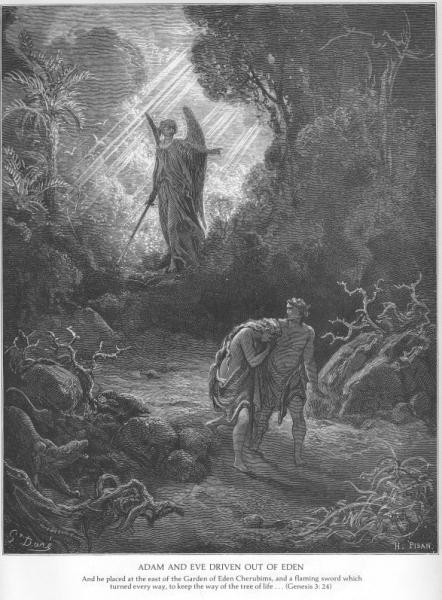

Is there such a thing as original sin? What is sin anyway? What are good and evil?
To consider such weighty questions, perhaps a definition of evil is the best place to start. Jeffrey Burton Russell, in his book The Devil, defined evil as "abuse of a sentient being." That is as good a definition as I know of. (I define a "sentient being" as any creature with the neural capacity to feel pain.) It presupposes no religious creed; it is a statement of demonstrable fact. To abuse, to inflict pain upon, a sentient being is evil. (Masochists, I suppose, would dispute this, but I don't wish to deal with their problem--or their lack of one--here.)
Then what is good? As good and evil are opposites, good is the opposite of abuse. It is care and love for a sentient being.
Abuse of a sentient being need not be inflicted by another sentient being to be evil. The offender can be Nature--disease, a tornado, a bolt of lightning. As long as the pain is felt, it is evil. (Why a merciful and omnipotent God should allow Nature to abuse us is of course an ageold question.) Can Nature be abused? Are we doing evil when we pollute the environment? The Earth is not a sentient being, but to abuse its resources is indirectly to abuse other sentient beings, and can therefore be seen as evil. Conversely, to protect the environment is good.
Are sin and evil synonymous? By the above definition of evil---the abuse of a sentient being--they are not. Sin is a theological concept; it is first cast in the Bible as an act of disobeying God. Adam and Eve disobey by partaking of the "tree of the knowledge of good and evil." Their act in itself shows that they were born sinners, that is, they were created with the capacity to disobey God. So "original sin" simply means the innate capacity of all human beings to sin. But was Adam and Eve's sin of disobedience evil? Applying Russell's non-theological definition of evil, who did Adam and Eve abuse?
The biblical term "knowledge of good and evil" may be interpreted as an idiom meaning "knowledge of everything." Adam and Eve, then, sought to attain more than knowledge of right and wrong: they were reaching for godlike knowledge or wisdom. That's what the serpent tells Eve: "ye shall be as gods, knowing good and evil" (that is, everything). Their sin was the sin of pride. But again, who did they hurt? Is disobeying God the abuse of a sentient being? If we interpret it as hurting God's feelings, I guess a case could be made. One could also argue that Adam and Eve hurt themselves and all their descendants by incurring the Edenic curse.

I therefore prefer the term "evil" to "sin," for "to do evil" avoids the theological thicket and makes it plain what is meant. Forget about Adam and Eve and their prideful reach for knowledge. To do evil is to abuse a sentient being. To do the opposite, to do good, is to please a sentient being. To show kindness and love. To put it biblically, "Do unto others as you would have them do unto you" (Luke 6:31), and "A righteous man has regard for the life of his beast" (Proverbs 12:10).
We do good, then, to love other sentient beings. And we are not doing evil--we are not sinning, if you will--in whatever we do, as long as it does not directly or indirectly abuse another sentient being.

Copyright 1999 by Ronald L. Ecker
Contact:
hobrad at outlook dot com
dragonswood at comcast dot net
Back to Top | Acre | The Ron Ecker Home Page